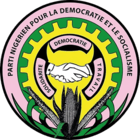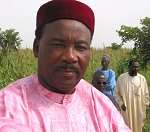Nigerien Party for Democracy and Socialism
The Nigerien Party for Democracy and Socialism (French: Parti Nigerien pour la Democratie et le Socialisme, PNDS-Tarayya) is a political party in Niger. It is a broadly left-leaning party, part of the Socialist International,[1] and since 2011 it has been in power following the election of its long-time leader, Mahamadou Issoufou, as President. Mohamed Bazoum is President of the PNDS, and its Secretary-General is Foumakoye Gado.
Nigerien Party for Democracy and Socialism-Tarayya Parti Nigérien pour la Démocratie et le Socialisme-Tarayya | |
|---|---|
 | |
| Leader | Mahamadou Issoufou |
| President | Mohamed Bazoum |
| Secretary-General | Foumakoye Gado |
| Spokesperson | Iro Sani |
| Founded | December 23, 1990 |
| Headquarters | 613 Avenue de l’OUA, BP 10894, Niamey |
| Youth wing | OJT (Organisation des Jeunes Tarayya) |
| Ideology | Social democracy Democratic socialism |
| Political position | Centre-left |
| International affiliation | Progressive Alliance Socialist International (since 1996) |
| Colors | Pink |
| National Assembly | 75 / 171
|
| Website | |
| http://pnds-tarayya.net | |

History
Third Republic
Established on December 23, 1990,[2] the party won 13 of the 83 seats in the National Assembly in the February 1993 parliamentary elections.[3][4] five of which were won in Issoufou's home department of Tahoua Department. In the presidential elections that followed, the first-multi-party election for the presidency, PNDS leader Mahamadou Issoufou, finished in third place with 15.92% of the vote in the first round.[3] As part of a coalition called the Alliance of the Forces of Change, the PNDS backed Mahamane Ousmane of the Democratic and Social Convention (CDS) in the second round, with Ousmane defeating Tandja Mamadou of the National Movement for the Development of Society (MNSD). In the National Assembly, the PNDS formed part of the AFC majority, and Issoufou was appointed Prime Minister.[4]
In a decree issued on 21 September 1994, Ousmane strengthened his powers at the expense of those of the Prime Minister, and Issoufou resigned on 28 September. The PNDS was unwilling to put forward another candidate to take Issoufou's place and withdrew from the AFC, thereby depriving the AFC of its parliamentary majority. The PNDS then formed an alliance with the opposition MNSD despite its history of hostility toward that party; Adji Kirgam and Mazou Ibrahim, two PNDS leaders who opposed this alliance, were expelled from the party.[4]
The loss of the AFC's majority led to an early parliamentary elections in January 1995, which saw the PNDS win 12 seats and the MNSD–PNDS alliance, together with two minor groups, gained a majority of seats in the National Assembly. Hama Amadou of the MNSD became Prime Minister while Issoufou became President of the National Assembly. This situation involved cohabitation between the new government and President Ousmane, and intense rivalry developed between them. In January 1996, the military under Ibrahim Bare Mainassara seized power in a coup.[4]
Military rule and Fourth Republic
In the July 1996 presidential elections, won by Mainassara in the first round, the PNDS candidate Issoufou officially finished in fourth place with 7.60% of the vote.[3] Along with other opposition parties, grouped together as the Front for the Restoration and Defense of Democracy, the PNDS boycotted the November 1996 parliamentary elections.[5]
Fifth Republic
Following another coup in April 1999, Issoufou finished second in the first round of the presidential contest in the general elections held later in the year, receiving 22.79% of the vote. In the second round he received 40.11% of the vote and was defeated by Tandja. In the parliamentary elections, the PNDS won 16 of the 83 seats in the National Assembly,[3][6] becoming the largest opposition party.
In the 2004 general elections, Issoufou was the party's presidential candidate again. He finished second in the first round of voting with 24.6% of the vote, and was defeated again by Tandja in the second round. In the parliamentary elections, the PNDS received 13.4% of the vote and won 17 of the 113 seats; eight additional seats were won by alliances of the PNDS with the Nigerien Progressive Party – African Democratic Rally, the Nigerien Self-Management Party, the Union of Independent Nigeriens and the Union for Democracy and the Republic.[3]
Sixth Republic
The party boycotted the 2009 parliamentary elections.[7]
Seventh Republic
The party did contest the 2011 general elections, with Issoufou elected President in the second round, defeating Seyni Oumarou of the MNSD, whilst it emerged as the largest party in the National Assembly, winning 34 of the 113 seats. Issoufou was re-elected in the 2016 general elections amidst a second-round boycott by his opponent Hama Amadou. The PNDS retained its status as the largest party in the National Assembly, winning 75 seats in an expanded 171-seat body.
Electoral history
Presidential elections
| Election | Party candidate | Votes | % | Votes | % | Result |
|---|---|---|---|---|---|---|
| First Round | Second Round | |||||
| 1993 | Mahamadou Issoufou | 205,707 | 15.92% | - | - | Lost |
| 1996 | 183,826 | 7.60% | - | - | Lost | |
| 1999 | 435,041 | 22.79% | 710,923 | 40.11% | Lost | |
| 2004 | 599,792 | 24.60% | 794,357 | 34.47% | Lost | |
| 2011 | 1,192,945 | 36.16% | 1,797,382 | 58.04% | Elected | |
| 2016 | 2,252,016 | 48.43% | 4,105,499 | 92.49% | Elected | |
| 2020 | Mohamed Bazoum | |||||
National Assembly elections
| Election | Party leader | Votes | % | Seats | +/– | Position |
|---|---|---|---|---|---|---|
| 1993 | Mahamadou Issoufou | 183,150 | 14.62% |
13 / 83 |
||
| 1995 | 203,629 | 14.08% |
12 / 83 |
|||
| 1996 | Boycotted | 0 / 83 |
||||
| 1999 | 378,634 | 21.47% |
16 / 83 |
|||
| 2004 | 314,810 | 13.76% |
17 / 83 |
|||
| 2009 | Boycotted | 0 / 83 |
||||
| 2011 | 1,066,011 | 33.00% |
34 / 113 |
|||
| 2016 | 1,701,372 | 35.73% |
75 / 171 |
|||
| 2020 | Mohamed Bazoum | |||||
References
- List of Socialist International parties.
- "Discours du Camarade Issoufou Mahamadou a l'occasion du meeting célébrant le 15ème anniversaire" Archived 2007-09-29 at the Wayback Machine, PNDS website, January 8, 2006 (in French).
- Elections in Niger, African Elections Database.
- "The rise to power of an opposition party: the MNSD in Niger Republic", Unisa Press, Politeia, Vol. 15, No. 3, 1996.
- "Élections législatives sans l'opposition þet sans commentaire" Archived 2007-09-27 at the Wayback Machine, Afrique Express (in French).
- ""Rapport de la Mission d'Observation des Élections Présidentielles et Législatives des 17 octobre et 24 novembre 1999"" (PDF). Archived from the original (PDF) on 2005-10-18. (1.06 MiB), Organisation internationale de la Francophonie (in French).
- Elections in Niger African Elections Database